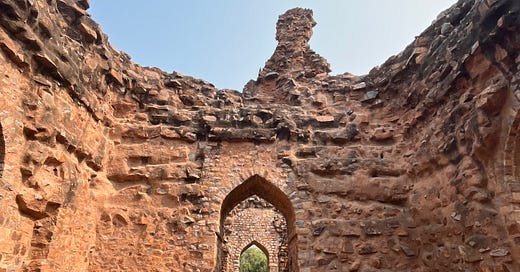Alauddin and Jalaluddin
The betrayal of the first sultan of Delhi's Khilji dynasty (by the second)
This weekend I got a chance to see the grave of Alauddin Khilji in Delhi. You might remember the character from the Hindi period drama film Padmaavat directed by Sanjay Leela Bhansali. Khilji was played by the talented Ranveer Singh, also known for his flamboyant sense of style. As for Khilji’s style, he was patient, ambitious, ruthless, and aggressive- he considered himself the second coming of Alexander the Great, ruled as the emperor of the Delhi Sultanate for over 20 years and was the antagonist of a 15th century Sufi epic poetry Padmavat by Malik Muhammad Jayasi. Here I write about his brutal and faithless betrayal of his uncle to ascend the throne for the Delhi Sultanate.
Image: Grave of Alauddin Khilji, in the Qutb Minar Complex
Alauddin Khilji was raised by his uncle Jalaluddin Khilji since infancy and would eventually marry his daughter Mallika-i-Jahan. Jalaluddin had taken over from the Mamluk dynasty to become the first sultan of the Khilji dynasty in Delhi Sultanate. He was 70 when he ascended the throne and was described as a modest, god-loving, pacificist and a reluctant ruler. Having been an officer previously in the Mamluk dynasty, he was uncomfortable about sitting anywhere else but the officer’s place in the royal audience hall. As a seasoned warrior, he did lead several military expeditions and fought Mongol invasions (Chagatai Khanate invasion of Punjab). However, he refused to inflict war or spill Muslim blood, causing some people in his courts to find him ill-fitted to be a sultan. This led to Malik Chajju from the former royal family to lead a revolt and declare himself the sultan independently. The old sultan crushed the revolt but as a pious Muslim, he refused to kill or punish the rebels and even allowed Malik an honourable confinement instead of execution. His leniency would eventually prove to be fatal for him.
Jalaluddin assigned the governorship of Kara, now empty, to his nephew and son-in-law Alauddin, then known as Ali Gurshasp. Ali Gurshasp had his ambitions brewing for a while- he did not just have Malik Chajju’s followers instigating him, he was miserable in his marriage and deeply resented his dependence on the family. Malika-i-Jahan and her mother were nouveau royalty, arrogant and held influence over the sultan. Patiently planning against his uncle, Ali raided a neighbouring Hindu kingdom of Bhilsa with the intention of gathering resources to overthrow his uncle. In Bhilsa he learnt of the wealth of the Devagiri kingdom and kept this piece of information as the biggest asset of the loot for himself. A calculative and long-term strategist, Ali Gurshasp surrendered all the loot to Jalaluddin to win his confidence and suppress any detractors in the process. Meanwhile, Ali planned a raid on Devagiri and planted his brother Almas Beg (also married to a daughter of Jalaluddin) in Delhi to appease the Sultan of Ali’s loyalty. The plunder of Devagiri was successful and Ali was on his way back with a great amount of treasure when the news reached Delhi. Jalaluddin, trusting his nephew, was pleased with the news and prospect of wealth even though his counsellors raised alarm at the secret, unauthorized raid. The sultan then went to Gwalior with the expectation that his nephew would meet and present the exploits to him. When Ali headed to Kara instead, the council begged of the sultan to prepare to intercept Ali before he reached Kara. The sultan was still convinced of his nephew’s loyalty so instead headed back to Delhi. ‘Kill us all if your Majesty means to return to Delhi!', the sultan’s loyal council Ahmad Chap lamented.
Meanwhile, in Delhi, Almas Beg kept the guileless sultan deluded. Ali sent a letter confessing of his guilt and begging the sultan of a letter of pardon before presenting himself in Delhi. The sultan happily sent his special envoys delivering the message of pardon. Ali however detained the envoys to prevent them from letting Delhi know of Kara’s military growth. Almas convinced Jalaluddin of Ali’s deep guilt, and that Ali was ‘carrying around a handkerchief of poison’ and looking to kill himself. Jalaluddin was overcome by affection and rushed to Kara to deliver his pardon personally, against all caution of his counsel. It was 1296 AD and the holy month of Ramazan when the sultan embarked on a journey with only a thousand soldiers, to Kara. The sultan’s troop-laden boats were made to stay on the other side of Ganga, on the suggestion of Almas Beg. Even the confidants were made to remove their weapons. At the looming possibility of being trapped, the sultan of Delhi, complained a little of Ali not being present to receive him. His nobles stood with their sinking hearts as the sultan recited the Quran. Ali met the sultan at the landing and greeted him with great ceremony. Jalaluddin, perhaps still hopeful, raised him from his feet, kissed him and declared his love for him. At signal, Ali then killed his uncle, mounted his severed head on a spear and proclaimed himself the new king. He was 30 at the time. Amidst the heavy rainfall of July along the Ganga, Alauddin Khilji began enlisting his army to march to Delhi.



